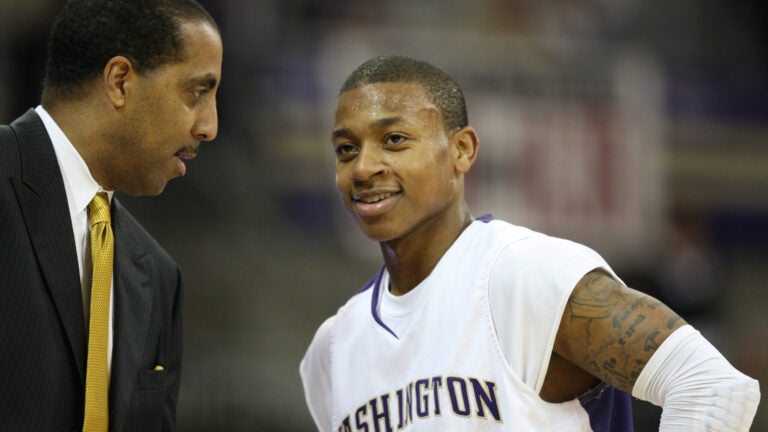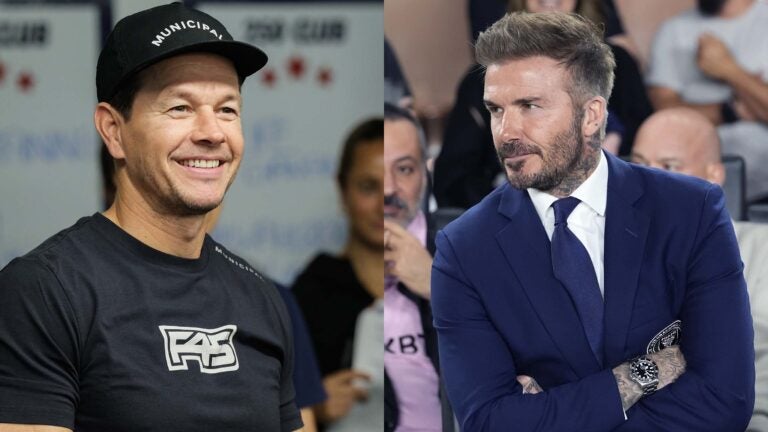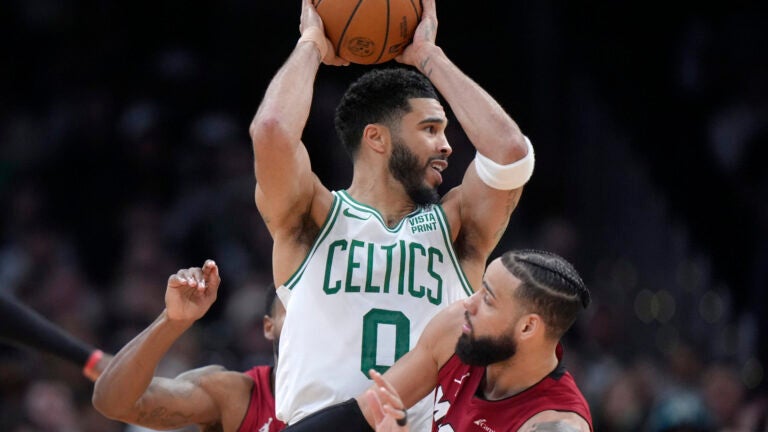Markelle Fultz and Isaiah Thomas had the same coach. He knows they can be great, together.
Lorenzo Romar coached both guards at the University of Washington.

Isaiah Thomas. Markelle Fultz.
Thinking about those two players, both point guards, as teammates makes some worry about redundancy on the Celtics’ roster. Others think about trade bait for Danny Ainge. Meanwhile, available minutes in Brad Stevens’ rotation might be another concern. But when Lorenzo Romar thinks about those two players, playing together in Boston, he doesn’t see potential problems.
He sees potential greatness.
“With the Detroit Pistons, with the Bad Boys, Joe Dumars and Isiah Thomas, both of them were complete guards,” Romar said while Thomas and the Celtics were playing in the Eastern Conference Finals. “Way back in the day, New York Knicks, Earl Monroe and Walt Frazier, those guys were complete guards and they played together.”
And, he should know when it comes to Thomas and Fultz.
Romar, the head coach at the University of Washington from 2002 through the 2016-2017 season, recruited both players while they were in high school and mentored them through their college careers in Seattle. He is not worried about them being on the same roster. He’s excited by the prospect.
“Both of them have played with the ball and without the ball,” he said. “And they both can be effective with the ball and without the ball. And that’s the beauty of both of those guys. There are some who are such pure point guards that if they don’t have the ball in their hands then they don’t know how to function. Both those guys are complete guards.”
While Romar believes the versatility and dynamism of both guards makes them compatible on the floor, he believes it is more than technical basketball skills that connects them.
“The thing about both of those guys is neither one of those guys, early on, were projected NBA players. Neither one. It came later for both of them, and for Isaiah, much later,” he said. “So they have kind of an innate chip on their shoulder, they’re so driven because of it. They haven’t been given everything their whole life, on the basketball for sure. They haven’t been given anything. They had to earn everything. So neither one has a sense of entitlement, which makes them great with teammates and for any program or franchise. They don’t have that sense of entitlement. They’re both giving people. You don’t find that very often nowadays.”
With the 2017 NBA Draft fast approaching, Romar, currently the associate head coach at the University of Arizona, shared his memories of both players before and during their stints at Washington as well as his thoughts on their relationship and potential as NBA teammates in Boston.
(This interview has been lightly edited and condensed)
Boston.com: When did you first see Isaiah play? What were your first impressions?
Lorenzo Romar: One of my assistants at the time, Cameron Dollar, when I was at the University of Washington, first saw Isaiah play. It was a group of young kids on his team, he must have been in the eighth or ninth grade when he had first seen him, but didn’t tell me anything about him because he was so young. But once he got to high school, I kept seeing Isaiah Thomas, Isaiah Thomas, 45, 38, all these points. Finally, myself and Cameron were talking and he said, “Coach, he’s really small but he can score. It doesn’t matter, he can score on anybody.” I said, “Man, I got to see him play.” So, finally, I went to see him play, and I saw what everyone was talking about. It was true. It was. Scoring was so easy for him at that level.
What was it about his personality that won you over, made you believe he could do that at the college level?
LR: As you continued to watch him, you’d see him do that against anyone and any team he played against. He had a certain demeanor on the floor that implied, I have a secret that you guys don’t know about. You think I’m small and can’t get this done. You’re going to find out, and you’ll see by how I play.
Never nervous. Never rattled. It was almost as if he had been there before and just kind of knew what was going to happen. He didn’t care if you didn’t believe in him. But he had a chip on his shoulder because not a lot of people did, and he played with that chip. Some players talk trash on the floor because they’ve seen someone else do it or they can’t control their emotions. He had such a passion and love for the game, that there was a game within a game for him. It was all part of that secret. And he played against everyone as if, you probably doubt me too.
You knew the secret, but were there times he still surprised you? When you coached him? Or even in the NBA?
LR: When we had him, nothing that he did surprised us. When he made the NBA, again, that didn’t surprise me. When he found his way to get in and play minutes and they would play guys ahead of him when they would come in and then it would take a few weeks and he would beat them out, those things didn’t surprise me.
Surprise is not a good word, but I don’t know what the word is.
He started to exceed my expectations, I would say, when he was with Boston. That’s when it was like, whoa, whoa, is this what he’s about to do? He’s about to become an All-Star!
He was in our gym the summer before his first All-Star Game a couple of years ago, and I remember having a conversation like “Isaiah, you’ve got a chance to be an All-Star coming up.” He didn’t say it, but he gave me a look like, yep. Or you know, duh.
But that’s when he began to go even further than I thought he would in the NBA. I thought he would fight his way in and make it. I thought he could eventually, in the right situation, play a lot of minutes, maybe be a starter. But I didn’t know he could become not only an NBA All-Star but the face of a franchise, especially one such as Boston.
When you saw him two summers ago? Do you think he knew he could do those things?
LR: Yes.
When did you first see Markelle? What was your first impression?
LR: I first saw him in the summer going into his junior year [in high school], but it was kind of a blur. I was watching a bunch of guys. When I really focused on him and honed in the first time was September of his junior year. That was after he had come off playing for the junior varsity. What I saw was a guy that was having a ball on the basketball floor, making plays and sometimes not making the play — and missing the shot or turning the ball over. But he did it with such ease and simplicity that you just thought, whoa, his potential is off the charts!

Lorenzo Romar, right, talks with Markelle Fultz during a Feb. 2017 college basketball game between Washington and UCLA in Seattle.
You mentioned Isaiah had that chip on his shoulder. What was Markelle’s demeanor when you first saw him on the court?
LR: Markelle was out there playing like it was his playground, like it was his personal playground. And he was just really having fun doing it. Isaiah was out playing like this was a boxing ring. They’re both on a mission, there is no doubt about it, but it’s a little different. Isaiah is just a little more serious in his approach, and Markelle, when I first saw him, was just out there having fun, having a ball. Isaiah, it was just a little more business with him.
How did Markelle evolve?
LR: Well, he began getting more serious out there on the floor, and then you could see he began to play with a chip on his shoulder. He started to grow a little bit, and he started playing more exclusively at the point, with the ball in his hand. He kept getting better. About every two or three months I would see him play, and every time he was a different player. This improvement was really moving quickly and going at a rapid pace. I’ll never forget, I think it was the spring of his junior year [in high school], his mentor and trainer Keith Williams would always tell him, “You have no idea what you can do, you have no idea what you’re capable of, you need to be more aggressive on the floor.” It was as if Markelle said, “Alright, I’m going to do it.”
So, he just went out and really pressed the issue. And he would turn the ball over, and his decisions weren’t the greatest at the time, but he was in uncharted waters at the time. He was stepping out of his comfort zone, he was trying to do things that he hadn’t attempted as much. But then toward the end, he had made his mistakes and learned from them, and that, for me, is when the monster was born.
It was if he was like, “OK, I see how to do this now, and I see how the game works. OK, let’s go now.”
That summer is when it became a joke, going into his senior year, when he had figured it out. And then after the summer, fall came and he got better again. It just kept happening.
When Markelle became the “monster” how did he compare to Isaiah or any of the other talented guards you had come through Washington?
LR: At that stage, he’s the best one. Yeah, he was the best one, at that stage.
As a floor leader or stylistically, how did Markelle compare to Isaiah when you had him?
LR: Well, when Isaiah was that age, he wasn’t really playing the point guard spot. He was just really kind of playing basketball. At that stage, the teams that he was on, they really just relied on him; and he was so dominant in his scoring that he just had the ball in his hands making plays, whether it was scoring or whatever. He later became more of a point guard.
What were similarities and differences between how Isaiah and Markelle operated with teammates?
LR: At the time, Isaiah had more of a scoring mindset. Markelle would still defer a lot more than Isaiah did.
People in Boston and around the NBA are wondering how those two might interact on the court together. If you had them, as they exist today, how would you think about playing them either together or in a rotation?
LR: Well, both of them have played with the ball and without the ball. And they both can be effective with the ball and without the ball. And that’s the beauty of both of those guys. There are some who are such pure point guards that if they don’t have the ball in their hands then they don’t know how to function. Both those guys are complete guards.
With the Detroit Pistons, with the Bad Boys, Joe Dumars and Isiah Thomas both of them were complete guards. Way back in the day, New York Knicks, Earl Monroe and Waltz Frazer, those guys were complete guards and they played together.
Given what you’ve seen from both and your sense of basketball history, would you sense that this partnership had a chance to be that kind of a special backcourt?
LR: When I look at Boston’s backcourt as a whole — and you’re talking about Avery Bradley and Marcus Smart, Rozier, all those guys — I just think their core of guards they complement each other. Any combination of those guys can play together, which I think is wonderful.
Markelle could play with Avery Bradley. He could play with Marcus Smart. He could play with Isaiah. He could play with any one of those guys, but Isaiah is already doing the same thing. He plays with every one of those guys. There are times when Isaiah inbounds the ball and gives it to Marcus Smart and runs down the floor and Marcus Smart runs the team. They’re interchangeable.
Isaiah and Markelle have talked about one another and about working out together. What have you seen of their relationship?
LR: I think they’ve gotten to know each other from the time that Markelle decided he wanted to go to Washington. They’ve played with each other. I think Markelle came in from Day 1 and earned Isaiah’s respect. One thing that those guys, among others, really share in common is, I don’t know if I’ve coached two guys with more of a passion and love for the game of basketball. There have been guys who are close, but those two are right there at the top.
When you think about that passion, are there specific memories that represent that for you?
LR: I’ll just say that their overall bodies of work, day in and day out, they’re just always in the gym. Isaiah, to this day, will come up and he’ll find a gym — and he’s in the gym at six in the morning. That’s his first workout of the day. He’ll do three-a-days, four-a-days. If he’s in town for an autograph session somewhere, he’ll go find a gym where there is pick-up and go play. Markelle is the same way.
What about how they handle themselves away from the court?
LR: The thing about both of those guys is neither one of those guys, early on, were projected NBA players. Neither one. It came later for both of them, and for Isaiah, much later. So they have kind of an innate chip on their shoulder, they’re so driven I think because of it. They haven’t been given everything their whole life, on the basketball for sure. They haven’t been given anything. They had to earn everything. So neither one has a sense of entitlement, which makes them great with teammates and for any program or franchise. They don’t have that sense of entitlement. They’re both giving people. You don’t find that very often nowadays.
I’ll share a story about both guys:
The first month of school that Isaiah was with us as a freshman in college we went to a gospel mission to feed the homeless, serve lunch. And Isaiah and I were talking, and I said, “You done this sort of thing before?” And he said, “Coach, my dad took us every week to do this sort of thing since I was very young.” I thought that was interesting.
When Markelle was here, we had the team over for dinner early in his freshman year. My wife was preparing dinner and guys were playing ping pong or pool or watching television. Markelle was not around. I went upstairs and he was helping my wife set the table for the dinner. She didn’t ask him to do that. He sat a few practices because he had a little a nagging injury and during that week he’d get water and bring it to guys on the sideline.
Those sorts of things make those guys special to me, not just their talent.





